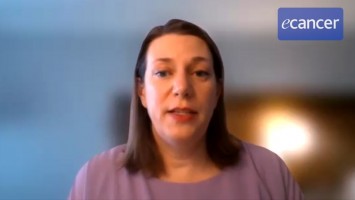Venetoclax is an oral BCL2 inhibitor that is a highly targeted drug. It has already been shown to be quite effective in CLL and mantle cell lymphoma. Preclinical studies have shown that venetoclax also can induce myeloma cell death and the phase I trials with venetoclax and dexamethasone, as well as the combination of venetoclax bortezomib and dexamethasone, both showed significant efficacy in relapsed myeloma, particularly in patients who carried translocation t(11;14) which constitutes about 20% of patients with myeloma. In fact, preclinical studies have shown that bortezomib can synergise with venetoclax in inducing myeloma cell death by simultaneously targeting BCL2 and MCL1.
Based on the phase I trials a phase III trial was planned that compared bortezomib dexamethasone to venetoclax plus bortezomib dexamethasone to see if this would improve the depth of response and progression free survival. Patients were randomised to receive either bortezomib dexamethasone or venetoclax plus bortezomib dexamethasone. The clinical trial showed that there was a significant improvement in the progression free survival – approximately 11 months for bortezomib dexamethasone and about 22 months for venetoclax bortezomib dexamethasone – thus meeting the primary endpoint for the clinical trial. An increased depth of response, including higher minimal residual disease negativity, was also seen when venetoclax was combined with bortezomib and dexamethasone. However, there was an increased mortality amongst patients who were randomised to venetoclax in this phase III trial.
So, additional analysis was done looking at the subgroups of patients in terms of the benefit of venetoclax. What we found was that patients with a translocation t(11;14) or patients who had a high BCL2 expression based on PCR testing, both those groups of patients appeared to have significant benefit. In fact, the translocation t(11;14) patients had a hazard ratio of almost 0.2 in favour of improved progression free survival or decreased risk of progression or death. In contrast, patients who had high risk features, so did not have a translocation t(11;14) or had low expression of BCL2, those patients did not derive any benefit from adding the venetoclax, in fact those patients actually had a higher risk of dying when randomised to venetoclax and bortezomib dexamethasone. In contrast, those patients with translocation t(11;14) or the high expression of BCL2 did not appear to have an impact on their overall survival.
So essentially what this trial is telling us is that venetoclax is active in myeloma. In combination with a proteasome inhibitor like bortezomib and dexamethasone it can improve the depth of response and progression free survival without affecting the overall survival in patients with translocation t(11;14). We also see similar efficacy benefit in patients with high BCL2 expression.
The trial continues with follow ups so we will have updated overall survival results at some point in time. There are other trials that are ongoing that are examining the role of venetoclax in multiple myeloma. In particular there is a phase III trial called the CANOVA trial that is comparing pomalidomide dexamethasone to venetoclax and dexamethasone in patients with translocation t(11;14). Other phase III trials are being planned.








